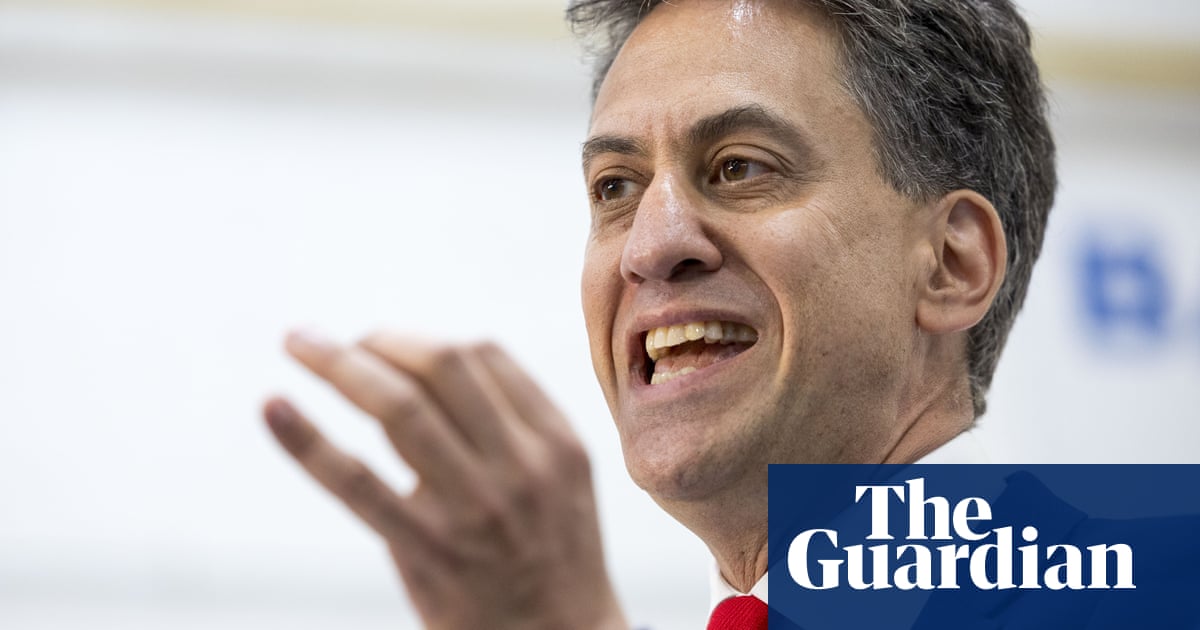
d Miliband was a cabinet minister before he learned how to ride a bike properly. He had mastered staying upright on two wheels as a child, but not much more. At around the same age he also picked up the rudiments of socialism, from the group of intellectuals and leftwing politicians that visited his father Ralph, an eminent Marxist academic. It was not until the summer of 2015, when the British electorate had firmly rejected Ed Miliband’s application to be prime minister, that he discovered the simple pleasure of cycling.
That story, the late bloom on a bike, is one of many personal vignettes seeded into Go Big, Miliband’s book about policy ideas that can change the world, and how to put them into practice. (Getting people out of their cars and on to cycle lanes is one chapter.) Go Big is not a memoir, but it does hint at a personal journey. Does the prescription contained in the book’s title imply that, as Labour leader, he went too small?
“I wasn’t bold enough.” Miliband answers my question without hesitation. “I was bold in my analysis, but I felt at the time that I wasn’t bold in my solutions. And since then, I have felt that the prescriptions didn’t meet the analysis.” He recalls giving “a waffly answer” when one interviewer asked if his election manifesto matched the ambition of a Margaret Thatcher or a Clement Attlee. “I used to console myself with the thought: well you’re in opposition, there’s only so much you can do.”
Go Big was born of the post-defeat decision not to settle for that kind of consolation. Miliband describes it as a call to “rediscover our agency” when faced with huge, seemingly intractable problems – inequality, insecurity in work, climate emergency, the unravelling of the social contract. “People can often feel powerless. For totally understandable reasons, if you’re on the progressive side of politics: you see a Tory government in power; you think – I hope – I want a Labour government, but what am I going to do in the meantime? There are other points of entry to power.”
Miliband started the book as a backbench MP, not anticipating a return to frontbench duty at Keir Starmer’s invitation last year. He likes to quote Barack Obama: “What’s troubling is not the magnitude of our problems but the smallness of our politics.” The book certainly looks across a broad horizon, covering social, economic and political reform. Each theme is extrapolated from a real-world case study, demonstrating that committed individuals and groups can achieve lasting, positive change. Common ingredients are imagination, building up from a small base, and an absence of caution when it comes to defying a prevailing consensus. The narrative sweeps across the world: a women’s strike for equality in Iceland; American campaigns against poverty wages; Viennese social housing; emergency flood response in Doncaster. The tone is energetic, eager but also quite specific on policy detail. The book does not shy away from what the author tells me is his “nerd-tastic” tendency.
This self-awareness – acceptance of the geek persona – is one of the ways in which defeat in 2015 has given Miliband a clearer voice. Even in the sterile environment of a Zoom call he comes across as more relaxed, more comfortable in his skin than he did as leader, when political caution sometimes seemed to stuff his mouth with cotton wool. (“That’s a good description of what it was like,” he replies when I offer the metaphor.) It is a recognised Westminster catch-22: sometimes the natural style that is required for success is only unleashed by failure.
In Miliband’s case, the paradox is doubly poignant because he was derided for advancing arguments that have since been absorbed into the political consensus. He warned that Britain’s underregulated, post-Thatcherite economic model had been captured by a predatory form of capitalism. That the system was rigged in ways that obstructed social mobility, stripped away security and fomented frustration.
Some of that analysis, and the accompanying recognition that the state has to be much more robust in fixing the problem, informed Theresa May’s 2017 manifesto. (She raided Labour’s idea of having workers represented on company boards, but lacked the courage and political bandwidth in her party to go through with it.) As part of its “levelling up” agenda, the current government is considering punitive taxes to prevent “land banking” – the practice of developers sitting on vacant real estate and watching its value soar without erecting new homes. When Miliband proposed a use-it-or-lose it crackdown on the same thing eight years ago, Boris Johnson denounced it in the Daily Telegraph as “Mugabe-style expropriations”.
That is not a new phenomenon. Johnson is famously uninterested in consistency. Ideological plasticity is why the Conservatives have a historical record as one of the world’s most formidable election-winning machines. There should be no comfort for Labour in having been right in theory without then gaining the power to put the ideas into practice. My concern with Go Big is that the sections on political effectiveness, which focus on community organising and applying political pressure from the outside, risk indulging Labour’s tendency to lean into the role of perpetual opposition. There is a fine line between celebrating the energy of a social movement and retreating from the hard task of winning over sceptical voters. The sound of true believers chanting Jeremy Corbyn’s name may have lifted the roof in auditoriums, but it did not carry Labour into government.
Miliband counters that activism, properly deployed in the community, can persuade people that Labour is on their side; proving the point with deeds, not just words. The party cannot appear on the doorstep as ambassadors from some remote “planet politics”, trying to harvest support. “If we’re community activists, it re-engages people. Politics has to be about what you are doing with people in their communities, not just about what the leader is saying on telly.” The book, he says, is meant not as a campaign blueprint but as a reservoir of evidence that effective routes to change are available. “I’m not going to pretend that this is the electoral strategy for Labour, but I am raising ideas to change the country; trying to lift eyes from the smallness of politics.”
The missing ingredient, I suggest, is a parable; a simple story that links the analysis of what has gone wrong in Britain to the policy prescriptions with the kind of crisp, campaigning resonance that has voters nodding along as they hear it. Miliband’s reply: “I’d have been prime minister if I’d had that in 2015.” When I ask if he offers Starmer advice – or consolation – drawn from his first-hand knowledge of how hard the job can be, there is, unsurprisingly, no comment. One service Miliband can perform for the current leader is sparing him unhelpful headlines generated by meddling predecessors.
He is confident there will be a chance for Labour when the Tories fail to deliver on their promises. “What you’ll see is a gap opening up between their rhetoric and the reality. They say they don’t want insecure jobs and all that, but they don’t actually do anything about it. They say they want a green revolution but they don’t believe in the role of the state to make that revolution happen.”
It may be true that Johnson’s shape-shifting act lacks intellectual coherence and depth, but if “levelling up” doesn’t work, surely the Tories will try other devices to shore up recent electoral gains. The capture of so-called “red wall” seats in the north and Midlands was achieved in large part because Brexit probed a deeper cultural alienation from Labour on questions of identity and national pride. The Tories will compensate for failure to deliver on the economic front by stoking culture-war resentments.
Miliband is less comfortable on this terrain. When I raise Labour’s disappointing performance in recent local elections he deflects with the observation that in his Doncaster constituency the party’s vote held up. When I suggest that the Conservatives will keep pushing arguments about flags and patriotism as long as it feels like a free punch on an undefended opposition bruise, he shifts the conversation to an area where the left finds easier agreement: “There is a consensus across Labour on the need for big economic change. That is the right thing for the country and where the mainstream and vast majority of the party is.”
Perhaps it is a legacy of exposure to Marx at a formative stage that Miliband’s political analysis defaults to a rationalising question of how economic power is distributed. His diagnosis might well be accurate, but accuracy is not always competitive in campaigns against nationalists and populists. The task is to defeat ruthless strategies built around the view famously expressed by the late Andrew Breitbart, propagandist of the US alt-right, that “politics is downstream of culture”.
I put that to Miliband and he responds with a global and historical perspective. He can rattle off a list of places where dramatic, positive change is happening right now, from Joe Biden’s US to Jacinda Ardern’s New Zealand. He also makes a compelling case for optimism based on a time, not so long ago, when the road to progress looked blocked. Yet the obstacles were swept away and unimaginable heights attained.
“I grew up in an era when the Berlin Wall was up and apartheid was going strong.” Miliband’s voice is now exuberant, a gearchange from rumination to exhortation; no cotton wool in the mouth. “Think about the transformation in our adult lifetime! Think of transformation in LGBT rights; how inconceivable it seemed when Section 28 was being passed that, within 30 years, equal marriage would have been on the agenda.” This belief that surprising, uplifting change happens, and can be made to happen, is why he didn’t quit Westminster in 2015. “Why didn’t I just go off and become an academic? I mean, my dad was an academic. There are lots of great academics out there doing really important things. I’m a politician who has always been interested in ideas, but I want to make change happen in the country.”
Here speaks a man who fell down, or was knocked over in the political race, dusted himself off and climbed back on to the bike. “It is really important to remember the extent to which things can change in ways you don’t anticipate, in ways that people can’t see.” That, in essence, is the message of Go Big. It is a book conceived in an idealism that has collided with reality but resisted the retreat to cynicism. “You have to hang on to hope,” he says as our time runs out. “I mean, God knows, I should know that.”












